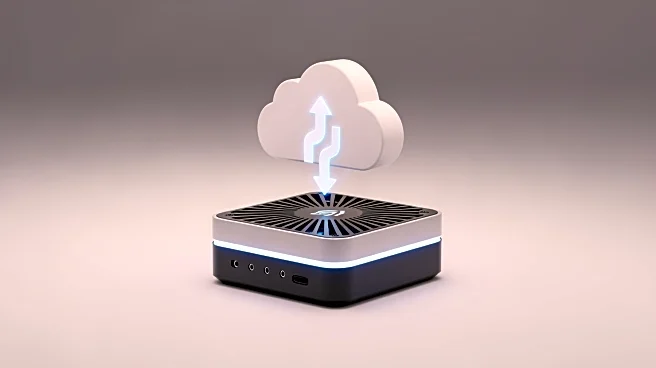What's Happening?
The article discusses how mini PCs, when paired with cloud gaming services like NVIDIA GeForce NOW and Xbox Game Pass, can serve as a cost-effective alternative to traditional gaming setups. Despite having
modest hardware, mini PCs can run AAA games such as Cyberpunk 2077 and Elden Ring at high frame rates by leveraging cloud gaming technology. The setup requires a mini PC, a monitor, a keyboard, a mouse, and a stable high-speed internet connection. The Beelink EQR6 is highlighted as a recommended mini PC due to its solid CPU performance and affordability. Cloud gaming services allow users to play games they already own on powerful servers, thus bypassing the need for expensive gaming hardware.
Why It's Important?
This development is significant as it democratizes access to high-performance gaming, making it more affordable for a broader audience. By reducing the need for expensive gaming hardware, cloud gaming on mini PCs can lower the barrier to entry for gamers, potentially expanding the gaming market. This approach also allows users to allocate their budget more flexibly, investing in specific components like monitors while saving on others. The trend could influence the gaming industry by increasing demand for cloud gaming services and potentially impacting sales of traditional gaming consoles and PCs.
What's Next?
As cloud gaming continues to gain traction, it is likely that more consumers will explore mini PCs as a viable gaming option. This could lead to increased competition among cloud gaming service providers, prompting them to enhance their offerings and reduce prices. Additionally, manufacturers of mini PCs may see a rise in demand, encouraging them to develop more powerful and affordable models. The gaming industry might also witness a shift in consumer preferences, with more players opting for cloud-based solutions over traditional gaming hardware.
Beyond the Headlines
The rise of cloud gaming on mini PCs could have broader implications for the tech industry, including increased focus on internet infrastructure to support high-speed connections necessary for cloud gaming. It may also drive innovation in cloud computing and data center technologies to handle the growing demand. Furthermore, this trend could lead to changes in how games are developed and distributed, with a potential shift towards cloud-optimized gaming experiences.










